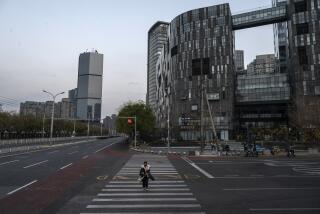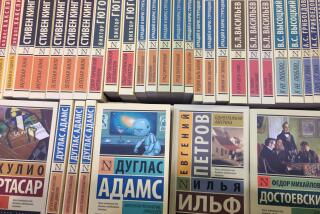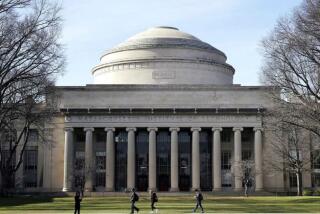GORBACHEV IN CHINA : Chinese Trained in Moscow Take Key Roles as Relations Improve
BEIJING — Hu Lisheng was only 25 when she returned in 1960 from study in the Soviet Union to suddenly become, in the wake of worsening Sino-Soviet relations, a key expert at an airplane factory.
“That was a very difficult time,” Hu, who trained for five years in the Soviet Union as a metallurgical specialist, recalled in a recent interview. “This was a factory that Soviet experts had helped build, and they had just been withdrawn. . . . Everything depended on us, the recent college graduates, so we worked days and evenings.”
Hu now helps run the Huayang Technology and Trade Corp., a state-owned enterprise engaged in Chinese ventures with other countries. She is one of about 14,000 returned students who studied in the Soviet Union during the 1950s.
With Soviet President Mikhail S. Gorbachev in Beijing to formally restore good relations between China and the Soviet Union, these returned students form a core of Russian-speaking experts who are now moving into top positions in government, academia and business. They are likely to play important roles in cementing better ties between the two nations.
Premier a Returned Student
Head of the class, one might say, is Premier Li Peng. About one-third of the members of the State Council, China’s cabinet, also studied in either the Soviet Union or Eastern Europe.
Li, 60, studied at the Moscow Power Industry Institute from 1948 to 1954 and became head of the Assn. of Chinese Students in the Soviet Union. He returned to China in 1955 to assume a series of positions in the power industry. He became a vice premier in 1983 and was confirmed as premier in April last year.
Largely because he studied in the Soviet Union, some observers have labeled Li pro-Soviet. But he has repeatedly denied this.
“If you follow that kind of logic, you may think that China will have a pro-United States government in 20 or 30 years, because it now has some 20,000 students in the United States,” Li said when asked at a news conference last year about perceptions that he was pro-Soviet. “The people who cherish that type of hope will find their hopes dashed, because Chinese students studying abroad first and foremost are patriots.”
Some might argue that Li underestimates the impact on Chinese students of a lengthy firsthand look at the United States, and some might question whether being pro-United States and being patriotic necessarily conflict for citizens of China.
Li clearly is accurate in viewing his own generation of returned students from the Soviet Union as highly nationalistic Chinese patriots. At the same time, almost all of them seem to welcome improved Beijing-Moscow ties as good for China.
Beyond this, their Soviet training has shaped their lives by giving them technical expertise and the broadening experience that living in any foreign culture provides. They have not, however, been exposed to the free-wheeling openness of Western societies, as are the students who go abroad today. As a group, they tend to be organization people, comfortable with planning, central control and a search for technological solutions to problems.
Li himself largely fits this image. He is often described by Western journalists and other analysts as an advocate of central planning.
Li clearly is more cautious in his approach to economic reform than some of his bolder or more outspoken colleagues. But Li is part of a team of political leaders moving China toward a more market-oriented economy, and it would be a mistake to view him as a traditional Soviet-style central planner.
An American businessman who attended a dinner party with Li a few years ago recalled how Li expounded at considerable length on various points made by Chrysler Chairman Lee A. Iacocca in his autobiography.
Seeming to realize that his guests were surprised at his lavish praise of Iacocca’s ideas, Li suddenly added, “Of course, I don’t agree with everything he says.”
This mixture of openness to the outside world and caution about straying too far from the mainstream is typical of Li’s generation of returned students.
Those who went to the Soviet Union were the elite of their generation. But there is a tragic underside to the lives of most, caused by the anti-intellectualism of the chaotic 1966-1976 Cultural Revolution. Now that life is better again, there is a shared commitment to stability and order.
Attacked as Intellectuals
The Cultural Revolution was a disaster for almost all intellectuals in China. Some returned students drew special criticism for their ties with the “Soviet revisionists,” but for the most part, returned students were attacked along with other intellectuals simply because they were part of the managerial and technical elite that the Cultural Revolution sought to overthrow or at least humble.
Hu, the metallurgical specialist, said that in 1961 she won praise as a “model worker” for the airplane factory but that she suffered “attacks” during the Cultural Revolution and that her husband died in 1971 as a result of persecution by radical leftists.
Shi Guobao, 58, a specialist in ultrasonic medical techniques at the Chinese Academy of Sciences who studied in the Soviet Union from 1956 through 1961, spent part of the early 1970s raising pigs. Like most scholars of his generation, he still deeply regrets the disruption to his career caused by the Cultural Revolution.
“We want to make greater contributions,” Shi said. “But we all feel that we’re getting old, and we don’t have enough time left.”
Since the start of the Cultural Revolution, Shi said, there hasn’t been much opportunity for him to use spoken Russian. He still sees Russian-language scientific papers, but he finds much more use for English, which he can read even though he does not speak it well.
Now, Shi said, he expects contacts with Soviet colleagues to become more frequent. But more important, he said, he hopes that Gorbachev’s visit will help make the world a better place.
“From the point of view of scientific workers like myself, it contributes to the exchange of scientific information and benefits all humanity if countries can be friendly and abide by the ideal of peaceful coexistence,” Shi said. “When we established diplomatic relations with the United States, I was very happy. Now I’m also very happy that good relations are being restored with the Soviet Union.”
Fang Jinghuan, 54, a returned student who is vice president of the China Enterprise Management Consulting Co., said she believes that most of those who studied in the Soviet Union are especially happy to see good relations restored.
Was Confident of Warming
“Even when relations were bad, I wasn’t tense, because I thought we would become friends again,” she added.
Fang--whose company specializes in advising larger enterprises on how to handle problems that emerge in the course of reforms--said she thinks that in the 1950s, China’s circumstances dictated the development of a planned economy. Now, however, times have changed, and China must carry out reforms that involve adopting management techniques from various countries, she said.
“We need economic reforms and also political reforms,” Fang said. “But these reforms must not change the fact that we are a socialist country.”
Hu, whose husband died in the Cultural Revolution, speaks in even stronger terms of her continuing faith in communism.
“Capitalism faces problems that cannot be solved,” she said. “And the development of capitalism up to today--especially its early development--was extremely cruel. . . .
“I support communism. I believe it can create a beautiful future. . . . If some people, some Americans, for example, expect China to take the capitalist road or become completely Westernized . . . I absolutely cannot agree with that.”
Yet in her own work, Hu, as deputy general manager of her company, is deeply involved in activities that foreign observers often view as the emergence of capitalism. She has visited the United States twice on business trips, and she helps run several joint ventures. She has varied stacks of different calling cards for her different posts, including one that identifies her as honorary board chairman of the Wide World International Advertising and Exposition Co. Ltd., a Sino-American joint venture.
“Every country--including the United States and including the Soviet Union--has its good points,” she explained. “We must look at things clearly and adopt the strong points of other countries. This is the most important thing.”
One of the great strengths of the United States, Hu said, is that it uses government policy and law to manage its economy, rather than direct administrative controls. There is no reason that such methods cannot be adapted to a socialist system, she said.
“Of course it’s possible!” she exclaimed with absolute certainty.
“If we make a lot of money, our company can pay more taxes to the state, we can build factories overseas to earn foreign currency for the nation . . . we can get good pay and we can send young people overseas for training,” she said. “But our company will never be made into a private corporation. . . . I am firmly supporting my ideals as a Communist Party member.”
UPSURGE IN TRADE--Soviets look for office space in Beijing. Business, Page 1
More to Read
Sign up for Essential California
The most important California stories and recommendations in your inbox every morning.
You may occasionally receive promotional content from the Los Angeles Times.










